Iran:
Take Two
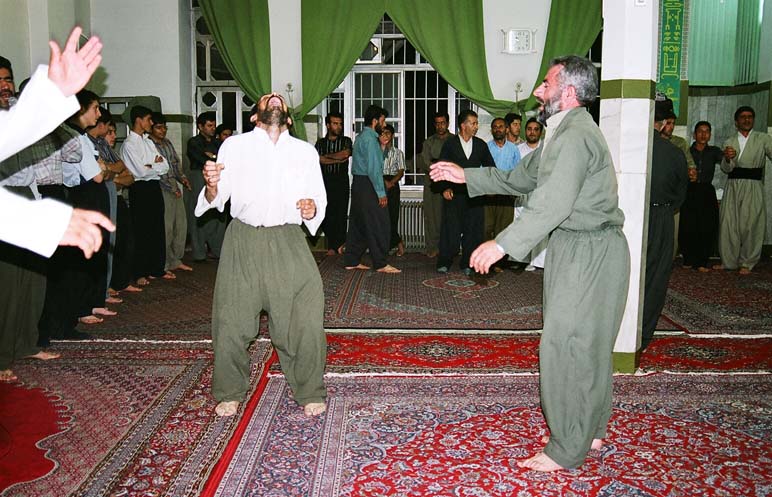
Dervish dancers get off on a Thursday night session in Paveh, a major
sufi city in Iranian Kurdestan. Under the steadily accelerating
rhythm of the taf musicians, a line of dancers holding hands snake
around the periphery of the hall. When they start feeling it,
individuals peel off of the line to spaz out in the middle of the floor.
I wasn´t intending to revisit Iran but it was simply the most expedient
way to get down from the Caucasus to the Persian gulf without expensive
backtracking to Istanbul and onward flights. Iranian visa
bureaucracy was friendlier to me this time, using a new Taiwanese
passport that I had to reapply for in Ankara. I took advantage of
the opportunity to visit a couple of remote mountain village areas that
I had missed on my first expedition.
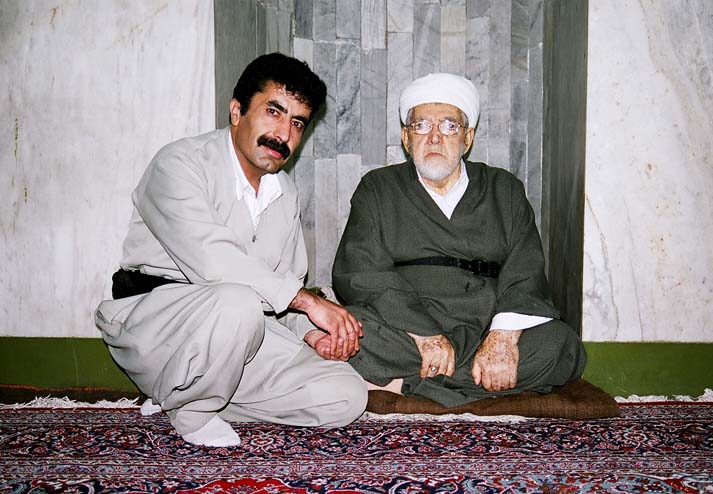 My
host in Paveh, the gregarious Shahrogh in traditional Kurdish wear,
with Sheikh Taha, the spiritual leader of the Paveh sufi sect.
Shahrogh tried to convince me that Iranians believe that eating honey
on watermelon (or fish with yogurt) will make you so dreadfully ill
that it can kill you.
My
host in Paveh, the gregarious Shahrogh in traditional Kurdish wear,
with Sheikh Taha, the spiritual leader of the Paveh sufi sect.
Shahrogh tried to convince me that Iranians believe that eating honey
on watermelon (or fish with yogurt) will make you so dreadfully ill
that it can kill you.
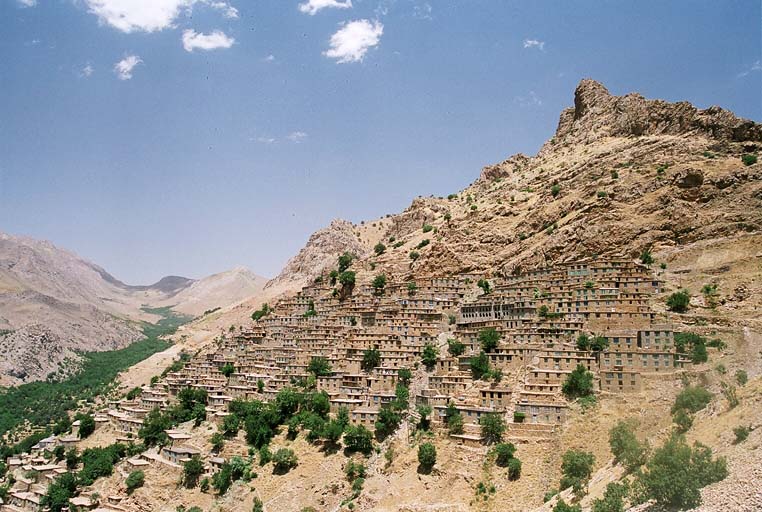
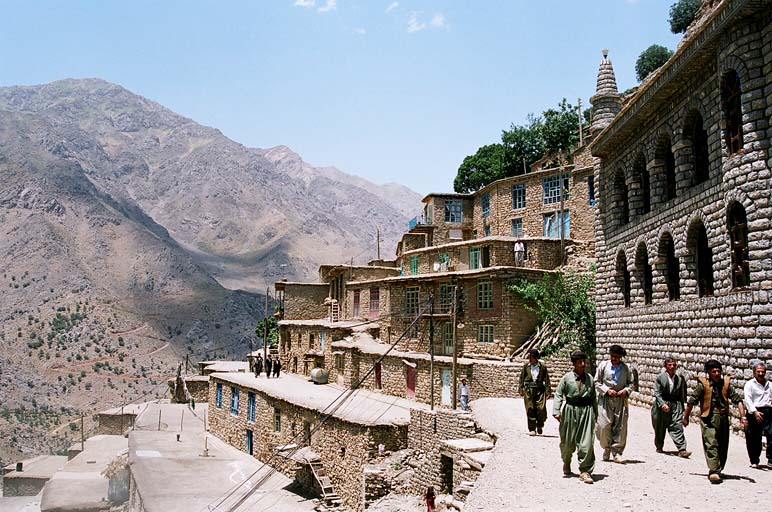
The mountain village of Howraman e-Takht
is embedded so remotely in the Howraman valley that time and
development almost passed it by. Still intensely conservative and
traditional, Howraman is as eye opening as any place in Iran, from its
dramatic site to its traditional stone masonry to the colourful outfits
to the apparent indifference of these hardy folks to strange tourists
wandering through. While far from the cultural tidepools of
Tehran so far away, this village is located less than 10 km from the
Iraqi border, where fellow Kurdishmen are busy trying to whip a new
country into shape. The nearby border city of Merivan is reputed
to be the site of heavy smuggling activities between the two
Kurdistans, and I may have been picked up hitchhiking by a group of
smugglers All seedy looking and uncomfortably aggressive, they
spoke Arabic and Turkish and had been to Afghanistan, Turkey, Iraq and
Turkmenistan, very odd vacation destinations for your typical Iranians.
After they started asking me about my passports, and refused to
pick up other passengers on the road in their spacious truck, I became
nervous and quickly found an excuse to change my ride.
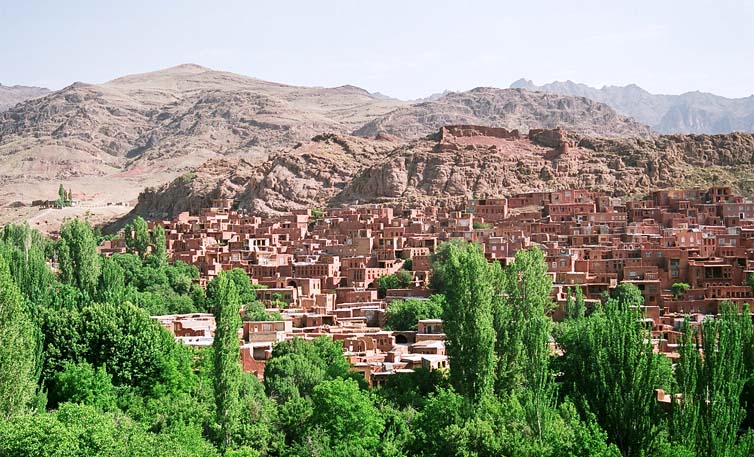
The mountain village of Abyaneh has a
curious dual life. One is a gorgeous mountain village with mud
buildings located not far from Natanz (site of the disputed Iranian
nuclear reactor suspected of enriching uranium), where old men and
women clad in centuries old traditional garb while away their sleepy
agrarian days. The other is as a remote and cool haven for Tehran
jetsetters who own a second home here and hold bacchanalian parties out
of the disapproving purview of the mullahs. Most intriguingly,
the two strata of this microsociety get along quite well, the youth
adding a twinkle in the eyes of the grandmas and grandpas, and the
smiling seniors providing an atmospheric and comforting shelter from
the brutality and harshness of the big city for the cosmopolites.
The truth is that hardly anybody cares much for the theocratic regime
in Tehran that is helping nobody but themselves and their cronies, and
those Iranians who speak English (even very religious ones) will have
no hesitation in coming out and telling you how much they hate the
mullahs.
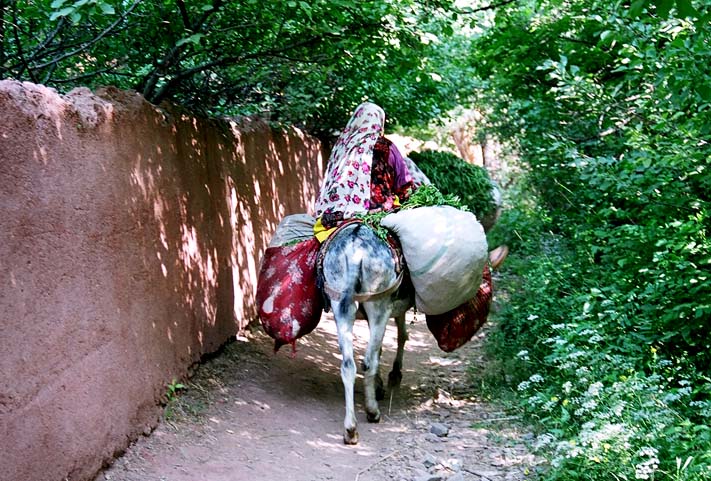
Abyaneh farmer bringing crops into town on
her mule. There is no housing in the village apart from a luxury
hotel, so I needed some luck arriving in the late afternoon. I
was soon invited in by 3 teenagers leading a donkey around. Oh
brother, I thought, but seeing as I didn't have many choices I accepted
their offer, expecting to be taken to a farmer's hovel. Instead
it turned out that the three were North Tehran brats from wealthy
families spending a week in their Abyaneh home to look for antique
artifacts in the nearby fortress. The donkey was a friend's, that
they were using to try to make extra money offering donkey rides to
daytripping tourists. The boys, one of whom is the rightful heir
to the title of King of Abyaneh, had finished their whiskey the night
before so they could only offer me simple foods and a shisha to smoke,
and talk about skiing and their cars and girlfriends. It turned
out to be a fairly interesting evening completely unexpected from the
way the village looked on the surface. This is typical of Iran, a
culture where nobody ever means what they say and real meaning lies
deep below the subterfuge of words and appearances.
BACK
to HOMEPAGE





